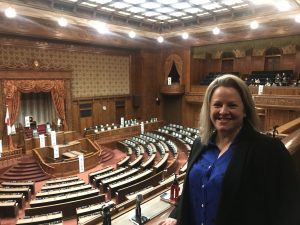
Vicky at the National Diet Building in Tokyo
Vicky Wise, Head of Leisure and Culture, Horsham District Council
This time last year I was applying for the JLGC Study Tour and couldn’t believe that there was such an incredible opportunity available. A trip combining my love for travel, the wonders of Japan and insights behind local government systems with a unique international viewpoint. I highly recommend this to anyone working within, or linked into, local government – it’s a truly wonderful experience.
About 15 years ago, I lived in Yokohama. I was on maternity leave and it lengthened and turned into a career break for a few years. I loved the day-to-day living and immersion into Japanese culture, particularly enjoying how Japanese public transport (and all public services) just work and are always to the minute on time.
For me, the JLGC Study Tour was a chance to see Japan from a completely different perspective. I felt it offered a glimpse into the workplace and democratic institutions within the country – something that most foreigners never get the chance to see. The tour was focused around the theme of climate change, shared challenges and possible creative solutions at a local level. Although I had spent plenty of time in Tokyo before (you can never spend too much time in Tokyo – it’s an amazing, vibrant city) and had travelled around Japan, I had never been to Kagoshima or Yakushima. I have to admit that I was really excited about the prospect of the active volcano in Kagoshima and when I did see it up close, smoking away, it was pretty spectacular.
Within the cohort of the tour, there were nine of us from a range of different tiers of councils from across the country, as well as specialist advisory organisations like the Local Government Association and an embedded journalist from the Local Government Chronicle. I gained so much from listening and interacting with my colleagues from the UK as well as the conversations with our Japanese counterparts. It meant there was a richness to the discussions with a variety of viewpoints and creative thoughts, sharing experiences and local examples, all crucial when approaching something so global and vital as tackling the climate emergency.
It was refreshing to take time out to think and reflect whilst listening to an international perspective on a range of topical issues. We had lectures from a renowned professor at Meji University on the Japanese democratic systems and met with a variety of officials from different levels of government. The role of devolution was an interesting aspect, with 44% of all public sector funding controlled by local government. I think we all viewed the funding distribution with envy considering the direct impact that local government has on communities. The Japanese population also seemed much more connected to their political leadership at a local level as well as national, voting patterns evidenced significantly higher turnout when compared to the UK. However, we also discussed longer-term challenges, particularly focusing on the falling birth rate, combined with an ageing population and very little appetite culturally for immigration levels to increase.
When visiting the island of Yakushima, which is just off the southernmost point of the main islands, we saw local democracy directly benefiting the local community in action. The island is a UNESCO world heritage site with incredibly beautiful and ancient forests, a unique ecosystem and the highest rainfall in all of Japan. It is also completely carbon neutral, utilising the rainfall with hydroelectric power plants alongside a mix of wind, solar, biomass and waste energy. The really interesting aspect is that the power grid is owned by the Yakushima municipality (essentially equivalent to a county council in the UK) and then three local cooperatives distribute the energy. Meaning that there is local control and accountability.
Each day of the tour was action-packed with incredible agendas literally timed to the minute, the Japanese expertise around timekeeping is pretty impressive. When using public transport in Japan you will notice that trains are always on time, spotless and really easy to navigate and access. This attention to detail was prevalent throughout the experience of the tour, the epitome of efficiency. Our hosts were hugely welcoming and hospitable and we were lucky to fit in some very unique Japanese experiences alongside the official programme, from karaoke in Tokyo, being buried in hot volcanic sand on the beach, formal dinners and speeches with extreme focus on the importance of etiquette through to staying in a traditional Ryokan (hotel) where you sleep on the floor and bathe in the clear volcanic pools. Not forgetting the food – I really love Japanese gastronomy and have previously tried all sorts of ‘delicacies’ (including some of which I never want to face again). We were treated to a range of delicious meals including the traditional rice and raw fish for breakfast as well as the Yakushima speciality of flying fish.
The tour was an absolute highlight for me, I would sign up every year if I could. It’s a wonderful chance to get a glimpse of Japanese local government and see shared challenges from an international perspective. I gained so much in terms of my personal development as well, working with colleagues from across the sector having in-depth discussions and the mental space to reflect in a very different way. Plus, it was brilliant fun, a great group of people, lots of laughter and unique travel experiences that just made it incredibly special.
Details of the 2025 tour will be published on JLGC’s social media on Facebook, X and LinkedIn, follow us to get updates when they are available.

